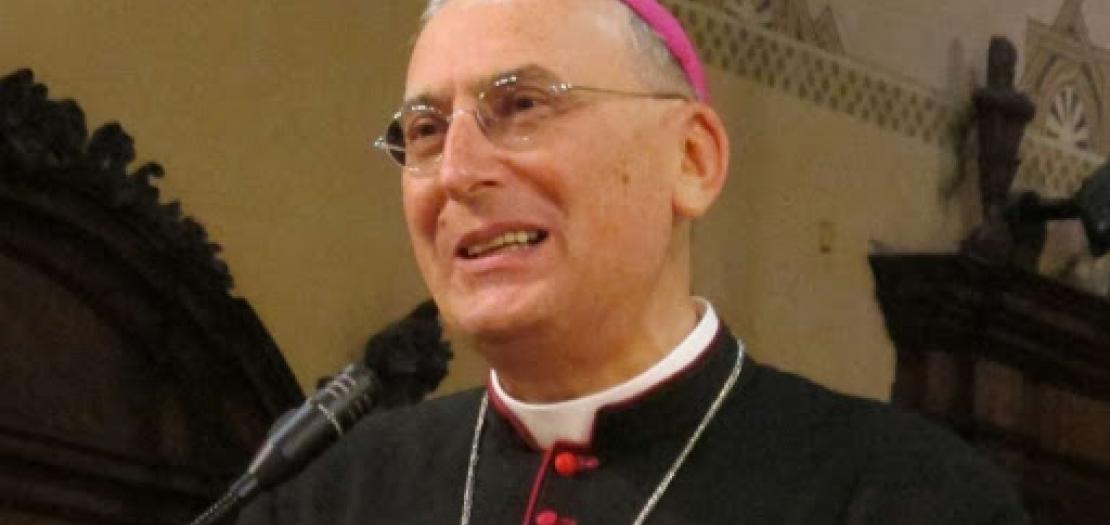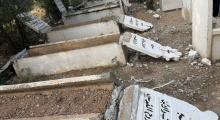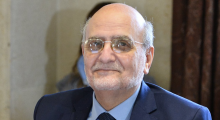Issued by the Catholic Center for Studies and Media - Jordan. Editor-in-chief Fr. Rif'at Bader - موقع أبونا abouna.org

Cardinal Mario Zenari, Apostolic Nuncio to Syria, says urgent and radical solutions are needed as the ‘bomb’ of poverty is exploding.
His remarks came ahead of the fifth European Union donor conference on Syria, during the conference “Church and Caritas: 10 years of humanitarian response in Syria,” organized by Caritas Internationalis, where the papal foundation shed light on the situation in Syria and urged the international community to act.
According to Caritas, 90 per cent of the Syrian population has plunged into poverty as a result of ten years of war, international sanctions, the coronavirus pandemic and economic crisis. A third of the population has fled the country and 12.4 million people do not have reliable access to food and heating.
Sixty percent of Syrian children are in urgent need of education, food and heating and 2.4 million children don’t have access to schooling. A major focus for Caritas Internationalis is investing in education for the thousands of Syrian children whose schooling has been interrupted because of the war.
The Bombs that Are Still Exploding
In his remarks, Cardinal Zenari acknowledged while it is true that bombs and rockets have not fallen on various regions of Syria for some months, “the terrible “bomb” of poverty has exploded, which, according to latest figure of the United Nations, inexorably affects about 90 percent of the population that are living below the poverty line. The highest percentage in the world!”
Ten years of war, corruption and sanctions, along with the crisis in Lebanon and the global Covid-19 pandemic, all contributed to the Syrian Pound losing much of its value against the US Dollar, the price of food significantly increasing, and people queueing to get limited bread and gasoline.
“The people call this difficult time as “economic war”, worse of that of the previous years,” he said, lamenting that aside from the attention given to Syria for this anniversary, the country has almost completely disappeared from the radars of the media.
While thanking numerous humanitarian efforts, especially Caritas Syria, the Apostolic Nuncio warned however, that the major emergency projects of the international community will not continue forever.
“I am particularly moved to see such generous solidarity. But let me say at the same time,” he admonished, “that I am also very restless. In the end, if we consider carefully, all these generous contributions are a “tap, faucet, rubinetto” of water in the desert! Very precious drops, but always a “tap, rubinetto” that risks giving less and less water over time!”
The challenges, he noted, are “enormous” and the possibilities, “very limited.”
“The major emergency projects of the International Community, mentioned earlier,” the cardinal reiterated, “cannot continue forever. Much of this aid, at this moment still urgent and necessary, is not an adequate long-term solution. Pope Francis said: “It is imperative to devise suitable and far-sighted solutions capable of enabling the beloved Syrian people, exhausted by war, to regain peace and to begin the reconstruction of the country.”
What’s Needed
“Syria needs, according to the experts, hundreds of billions of US dollars to build hospitals, schools, houses and factories and restart the economy!” he reminded.
“Without reconstruction and without economic recovery,” he warned, “peace will not come to Syria.”
“How long will Syrians have to wait?” he asked. “Time is running out. Many of them have lost hope. Urgent and radical solutions are needed.”
Cardinal Zenari recalled Special Envoy of the United Nations for Syria, Geir Pedersen’s words: “The present political deadlock between the Parties in the conflict must be overcome with the help of “a constructive international diplomacy on Syria.”
“This dynamic has to change,” he said, “What is needed is mutual and reciprocal steps step by step, from Syrian government and opposition, and key international players.”
“While the peace process is in in this moment in a complete deadlock, the poverty, on the contrary,” Cardinal Zenari warned, “is moving forward fast!”
Caritas’ Internationalis’ Secretary General, Aloysius John, also stressed that Caritas joins the Syrian Church in asking for “lifting unilateral sanctions, which were introduced at the beginning of the war; to increase access to services and healthcare, including COVID-19 vaccines for the suffering people of Syria; to ensure support to the NGO, in particular the faith-based organizations; a negotiated peace, avoiding continued stalemate, which only results in untold sufferings to innocent civilians.”
“Syrians, and especially Syria’s youngest generation, cannot afford the trials and the violence of this war any more. They deserve a better future,” he said.
According to a statement, Caritas has helped an average of 1 million people a year since the beginning of the war in 2011. Help has included food, education, repairing houses, psychological and health support, water and hygiene projects and, in recent years, an increasing move towards livelihood projects to help Syrians become more autonomous.
High Price Paid
Executive director of Caritas Syria, Riad Sargi, said: “Syrians have paid a high price for the war in Syria during the past ten years in terms of killing, internal displacement and refugees. Destruction did not distinguish between houses, public facilities, or medical or educational centers.”
“The sanctions and boycott of Syria, in addition to the Caesar Act,” he continued, “have negatively affected the lives of Syrian citizens, especially the most vulnerable, as these sanctions hit them at the core of their daily lives so that some of them could only eat bread and drink water. The garbage containers in the streets became a source of food for the poorest.”
“We want peace, we want dialogue,” said Archbishop Jean-Abdo Arbach, Melkite Archbishop of Homs, Hama and Yabroud, who also serves as president of Caritas Syria.
“We ask the government to cooperate with the opposition to restore human dignity. After 10 years of war, we ask for international cooperation. Because of the crisis in the Middle East, Syria has become forgotten,” he said.







